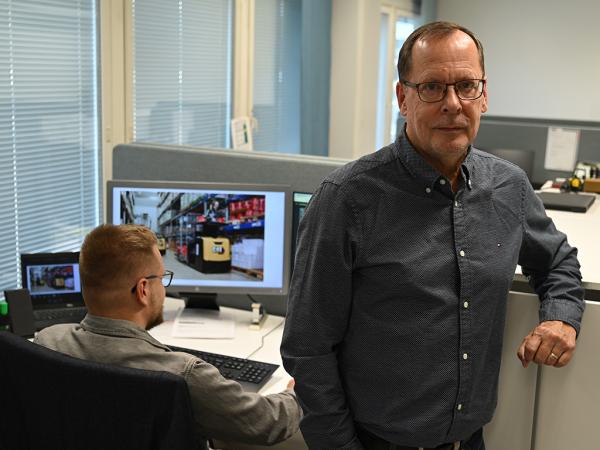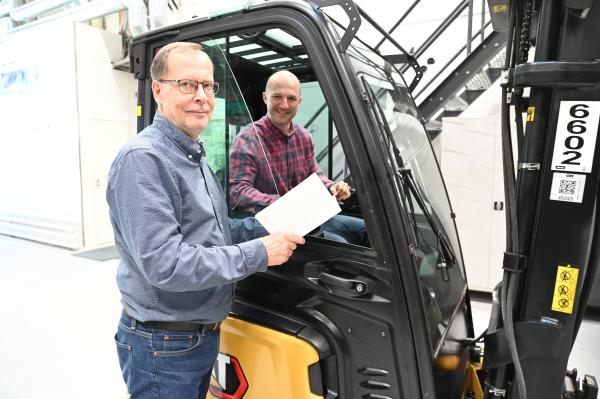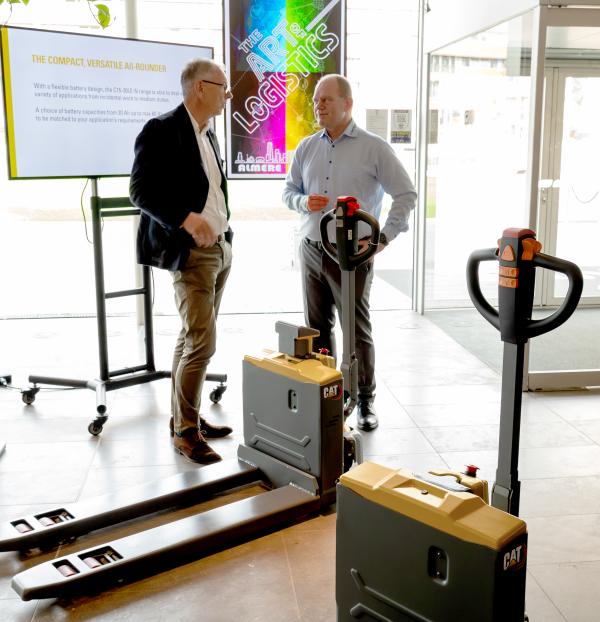What’s it like working in the world of forklift trucks, materials handling, warehousing and logistics? How has it changed over the years – and what does the future hold? For a well-informed view, we’ve talked to two of our most experienced colleagues who have seen it all.
Thomas Backlund and Erik Engelmann have each spent 35 years with the Cat® Lift Trucks ‘family’ of businesses in Europe. Thomas has worked mainly in lift truck product management. Erik’s career has been in business development and sales. Thomas Backlund is a Product Manager. He plays a key role in the development and supply of lift trucks to meet customers’ existing and future needs. This includes: working with the designers and engineers on truck specifications; supporting sales and marketing with training and advice on products; and dealing with orders for trucks, components and modifications.
Erik Engelmann is currently our Parts Sales Director. He has previously held several other senior business and sales management positions. These have involved developing, managing and supporting distributor and dealer networks, and increasing market share. His work has focused on a variety of specific European territories, and he now covers the whole EMEA region (Europe, Africa and Middle East).
Before moving to the forklift industry, Erik was a sales manager in the steel sector. One attraction toward our business was the prospect of dealing with finished products – forklift trucks – instead of component materials. He was also excited by the great challenge ahead, in 1989, as our multinational organisation was starting to set up a European base. He is very glad to have made that move. “It’s difficult to find any other industry that’s so diverse. What’s more, it just keeps on evolving and developing – so there’s always something new to keep me interested. I especially enjoy the wide variety of people and companies I work with.”
For Thomas, there was no particular reason for starting work in this sector. “It just happened,” he says. Still, he has no regrets over his choice of career. “Great colleagues, both in our company and at the dealerships, have made it very enjoyable. There have also been plenty of new challenges over the years to keep things fresh. I also like the nature of the work and its relationships. I have a lot of independence, but at the same time it’s not a ‘lone wolf’ position. It suits my personality.”
Forklift industry changes
Having lived through many advances in the design and use of lift trucks, Thomas sees digital development as the most significant.
“The forklift now comes with all sorts of digital functions and associated services. These have added a lot of value to the customers’ operations. It’s no longer just about the metal. In the same way, customers are now looking for more than just trucks. They want full logistics solutions.”
From a sales perspective, Erik has observed constant shifting in the prominence of different brands as forklift manufacture has grown in Europe and globally. Along with this has been a shift from diesel and LPG toward electric power and rapid growth in the warehouse truck segment. “Driver comfort and safety have become key. This, along with increased use of equipment that reduces manual handling, has helped to cut down on sick leave and turnover of staff. Related positive changes have included introduction of CE certification and growing awareness of the importance of forklift driver training.”
Erik adds: “Over the last ten years we have seen dramatic transformation resulting from the growth in online shopping. People demand rapid delivery of goods – preferably within a few hours! To meet that demand, retailers need large-scale warehouses, vast quantities of stock, and larger numbers of highly skilled forklift drivers. It’s easy to forget that lift truck drivers are absolutely vital in keeping the supply chain moving.”
Technological advances have greatly altered work practices for Thomas and Erik, as well the company’s customers. “Just look at how much office technology has changed from the 1980s to today,” says Thomas. “That has, of course, required updating of myself too.” Erik agrees: “We’ve gone from telex to fax; from huge Nixdorf mainframe computers to a laptop for every worker; from typewriting to voice messages; from paper to digital invoices and documents; and from physical shops and stores to web shops and online commerce.”
Forklift careers advice
For anyone thinking of starting a career in forklifts and logistics, or transferring from another industry, Thomas advises: “Try it – you might be surprised!” Or as Erik puts it: “Go for it. It’s an ever-evolving industry, constantly developing and reinventing itself. You will never be bored.”
Here’s a summary of their career advice:
- To be successful, you will need to study. Learning about lift truck products and technologies makes sense. If you’re interested in management and sales, look at business administration courses and degrees. If you’re more technically minded, consider technical and engineering courses and degrees. Many of our dealers run apprenticeship programmes for forklift service engineers/technicians and for commercial and sales skills.
- Whatever your interest, get up to speed with modern digital technologies used in the workplace and on trucks. Develop your social and communication skills, and your ability to build effective relationships with work contacts. That includes customers, managers at all levels, drivers and colleagues. Try to understand their needs so you can apply your creativity to work out solutions for them. Another tip is to learn extra languages – the more the merrier. This can be very useful in such a multinational business.
- Our industries will warmly welcome workers of all ages to meet increasing demands for staff. Older candidates bring life experience to the workplace – and often valuable technical knowledge. Personality and a positive attitude to work challenges are important too.
Future lift truck and logistics challenges
As Thomas prepares to retire at the end of this year, he has a parting message. “I hope for a more peaceful future for us all – with more love and fewer wars. As well as being good for humanity, peace would encourage economic growth worldwide. That, in turn, would bring stability to our industries and benefit all workers.”
Erik plans to continue in the business, and even after 35 years he is still preparing for new challenges. “Online shopping will drive further improvements in speed and efficiency. To stay competitive, warehouse owners will need to invest in, and keep up with, new trends and technologies. Integration of automated guided vehicles (AGVs) with conventional forklifts and workers is one growing area. Lift truck fleet management technology is another. We may also see a shift from buying trucks to ‘pay per use’. Looking further ahead, it’s impossible to predict exactly what the future holds – but it will certainly be different. This is a challenging and growing business that never stands still.”
For further reading
Here are some previous articles on working in the forklift truck, materials handling, warehousing and logistics industries:
- Careers in warehousing and logistics (Eureka 2023)
- Forklift operator training (Eureka 2023)
- Skills shortages (Eureka 2023)
- HGV driver shortages (Eureka 2022)
- The rise of the logistics manager (Eureka 2021)
- Investment in people (Eureka 2019)
- Logistics schools and universities (Eureka 2017)
- The changing face of working in a warehouse (Eureka 2017)



